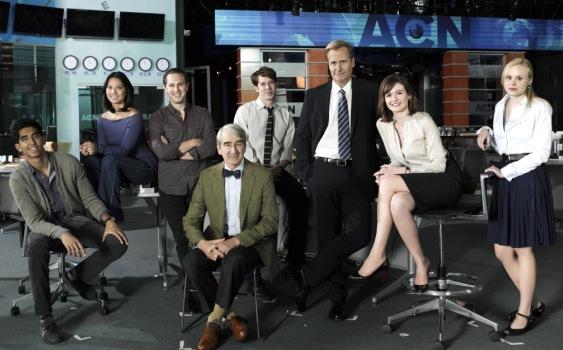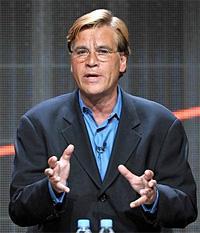 [Our newest guest contributor is someone who comes to us courtesy of our U.K. cohorts and their CST online website, but actually hails from this side of the pond, as professor and dean of the College of Communication at Butler University. And what he has to say about HBO's
[Our newest guest contributor is someone who comes to us courtesy of our U.K. cohorts and their CST online website, but actually hails from this side of the pond, as professor and dean of the College of Communication at Butler University. And what he has to say about HBO's The Newsroom
— which presents its season finale Sunday at 10 p.m. ET — strikes very close to home... -DB]
By Gary R. Edgerton
It’s complicated, being an American,
having the money and the bad conscience,
both at the same time.
–Louis Simpson from ‘On the Lawn at the Villa,’ Selected Poems, 1965
I haven’t given up yet on Aaron Sorkin’s newest creation, The Newsroom, but I’ve come close once or twice.
As has been the case with his earlier television series — Sports Night (1998-2000, ABC), The West Wing (1999-2006, NBC), and Studio Sixty on the Sunset Strip (2006-2007, NBC) — the critical response has been starkly polarized with professional and amateur commentators either loving or hating what they’ve watched of the program so far. My early take is that it remains to be seen whether The Newsroom will eventually find its sea legs as Sorkin struggles mightily — port to starboard — to balance his intentions of doing good by telling stories and not get washed overboard by too much bloviating and self-righteousness. After the four episodes I’ve seen up to this point, he’s only been partially successful in realizing his show.

Still, one thing that everyone can probably agree on is that the style and sensibility of the series is vintage Sorkin. With The Newsroom, Aaron Sorkin once again strikes me as a man out of time. He is an abundantly talented writer-producer whose excessively talky dramas seem much better suited to the post-war American stage than 21st century television and film. Nevertheless, Sorkin’s way with words and constructing a narrative is such that he not only survives in the Serengeti-like habitat of Hollywood, he flourishes. Think of the types of conventions that are now a taken for granted part of Sorkin’s television work in particular: the verbal fireworks, the rapid fire wit, those longish soliloquies that traverse a fine line between eloquence and bombast, and most of all, the "walk and talk" storytelling technique perfected by his close collaborator and director, Tommy Schlamme, on The West Wing.
Economy has never been Sorkin’s strength. His most memorable characters rarely use one word when they can get away with delivering ten at breakneck speed. Moreover, the quality that sets him apart from his contemporaries — and also drives his harshest critics crazy — is his unapologetic idealism, improbably emerging in settings (i.e., television, politics) that most of the American public views with cynicism at best to downright disdain at worst.
Cable TV’s version of the fourth estate is the subject of this new series and the opening title sequence serves as a kind of creation myth populated by the earliest pioneers of U.S. television news — Edward R. Murrow, Walter Cronkite, Chet Huntley and David Brinkley, and Don Hewitt — who seamlessly transition into the program’s featured actors as audiences are introduced to them one at a time working feverishly on the fictional News Night for the Atlantis Cable Network (ACN). Atlantis of course is the lost imaginary city of myth.
From the godlike perspective of the opening shot of a communication satellite orbiting earth to the heroic, portentous theme music by Thomas Newman, The Newsroom oddly evokes the nightly news shows on broadcast TV more so than the ironic, shoot from the hip stylistics and theatrics of cable news.
Jeff Daniels as Will McAvoy is much more NBC’s Brian Williams than Fox’s Bill O’Reilly. He projects a much more settled and stable persona than the former MSNBC firebrand commentator who bloggers have most speculated is the model for McAvoy, the preening, mercurial Keith Olbermann, who recently told the New York Times that "[t]his is the second show [Sorkin]’s done about my life" (referring also to Sports Night) after the writer-producer was embedded on Countdown (2003-2011, MSNBC) for a couple of days approximately two months after the Deepwater Horizon oil rig first exploded on april 20, 2010. Sorkin strongly denies Olbermann’s claim.
Be that as it may, the BP (British Petroleum) oil spill is the subject of much of the June 24 pilot episode, being the first of what has become a string of high profile breaking news stories from the recent past that most viewers are likely to recognize, soon to be followed by the rise of the Tea Party, Arizona’s Immigration Bill 1070, gun control, and the tragic shooting of Arizona congresswoman, Gabrielle Giffords.
Two basic premises strain the credibility of the first episode, "We Just Decided To." First off, McAvoy is described by a pompous Medill J-School professor who is hosting a Northwestern University public forum as the "Jay Leno of cable news" who is only "popular because [he doesn’t] bother anyone." Such a description runs counter to how the cable sector operates where being bland is more a death sentence than a recipe for ratings success. As episode 1:1 gives way to "News Night 2.0" (1:2), "The 112th Congress" (1:3), and "I’ll Try to Fix You" (1:4), McAvoy’s 1.1 million nightly viewers begin to inexplicably dwindle once he becomes edgier and starts speaking out. Go figure.
More importantly, the increasingly close knit coterie of
Newsroom regulars somehow know all the answers even before many of the preliminary questions are asked. For example, Emily Mortimer’s executive producer MacKenzie McHale’s protégé, Jim Harper (John Gallagher, Jr.) almost immediately perceives the deeper implications of the BP oil spill as a catastrophic ecological disaster rather than a search-and-rescue mission where eleven oil riggers lose their lives. Nudged in the right direction by another junior staffer, Neal (Dev Patel), who shares his concern with Jim about an oil drill explosion occurring that far below sea level, Harper gets to work on his smartphone and confirms the more significant ecological dimension of the story from his old college roommate who just happens to work at BP and his sister who is employed by Halliburton.
Such is the kind of wild coincidences that harkens back to the ancient Greek playwrights, nevermind the dramatists of postwar American theatre and film. In addition, it is more the stock and trade of broadcast TV dramas of a generation or two ago rather than what has become commonplace in both the cable-and-satellite and broadcast sectors of the television industry today.
Like all of Sorkin’s work, subtlety is in short supply in The Newsroom. The comparison that some critics have made over the years is to liken him to Frank Capra, and a case can be made in this regard, especially when considering their shared romanticism and blind faith in making things better. The storyteller I tend to think of first and foremost when I watch Sorkin’s work though is Stanley Kramer, the earnest, unreconstructed postwar liberal producer-director of such "message pictures" as High Noon (1952), The Caine Mutiny (1954), The Defiant Ones (1958), Inherit the Wind (1960), and Guess Who’s Coming to Dinner (1967), along with more than two dozen other feature films.
Kramer’s films tended to be stagy, wordy, and always had the potential to make you wince. He wore his beliefs and feelings on his sleeve and told stories with the certainty of someone who believed he knew the difference between right and wrong, and it was his duty to share that good news with everyone through his storytelling.
During the fifties and sixties, Kramer was already one of the last holdouts of a dying breed among his own generation of more modernist moviemakers. Today Sorkin is similarly old fashioned among his peers, corny rather than hip, taking up Kramer’s mantle as a whistle blower of sorts within the comfy confines of the Hollywood community.
Aaron Sorkin has found his niche as the canary in the gold mine, alerting us to the perils of an industry that Edward R. Murrow famously excoriated in a 1958 keynote address before the RTNDA (Radio and Television News Directors Association) as being "fat, comfortable, and complacent" and saying television was "being used to detract, delude, amuse, and insulate us." Murrow is clearly an example that Sorkin hopes to emulate, having his lead characters similarly speechify with all their might about recapturing those higher ideals he feels we once cultivated as Americans but somehow lost.
Consider Will McAvoy's brief exchange with his boss, Charlie Skinner (Sam Waterston), ACN’s news division president, from "I’ll Try to Fix You":
Will: "I’m on a mission to civilize."
Charlie: "How’s it going so far?"
Will: "Progress is slow but I’m in it for the long haul."
The rub is that Aaron Sorkin is pining for a past that is far more complicated and nuanced than the overly simplified view that fuels The Newsroom. Charlie tries to encourage Will to take more chances in the pilot by telling him that "anchors having an opinion isn’t a new phenomenon. Murrow had one, and that was the end of McCarthy. Cronkite had one, and that was the end of Vietnam."
Such shorthand may make for a pithy exchange, but it’s poor history. Ed Murrow finally did rise to the occasion against Joseph R. McCarthy, but he hardly took down the junior senator from Wisconsin as is suggested in The Newsroom. Likewise, Cronkite did use his podium at CBS on February 27, 1968 (or one month after the Tet Offensive stunned the Johnson administration) to tell the American public that "we are mired in a stalemate," but he was far from being an early critic of the Vietnam War and he certainly wasn’t a deciding factor in determining the United States’ withdrawal.
These kinds of shortcuts as well as audience friendly tropes, such as Will and MacKenzie sharing a romantic past and three attractive junior staffers being involved in a turbulent love triangle, seem especially formulaic and obvious in our post-Soprano era when the game in television drama has been so irrevocably raised.
Hopefully The Newsroom will eventually reach the heights of Aaron Sorkin’s best work. It still has time. On July 2, HBO renewed the series for a second season. We’ll just have to wait and see.
Gary R. Edgerton is Professor and Dean of the College of Communication at Butler University. He was previously Eminent Scholar, Professor, and Chair of the Communication and Theatre Arts Department at Old Dominion University. His latest books are Westerns: The Essential Journal of Popular Film and Television Collection with Michael T. Marsden (Routledge, 2012) and Mad Men: Dream Come True TV (I.B. Tauris/Palgrave Macmillan, 2011), while The Sopranos is forthcoming in March 2013 from Wayne State University Press as part of its TV Milestones series. He also co-edits the Journal of Popular Film and Television.